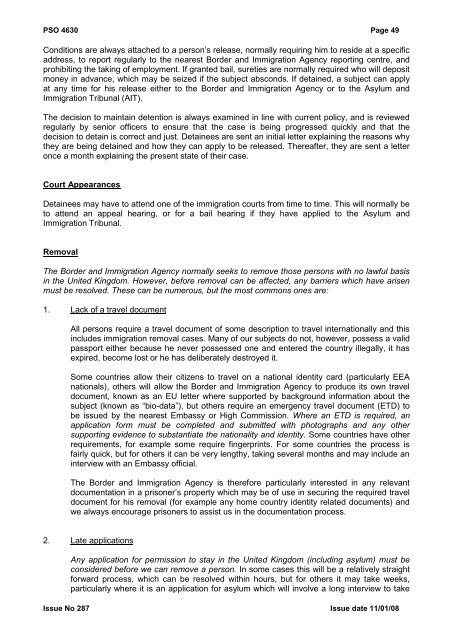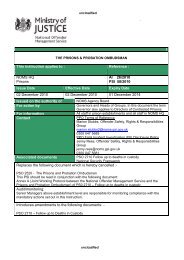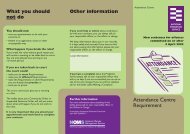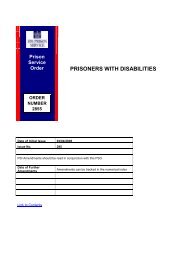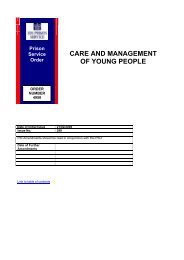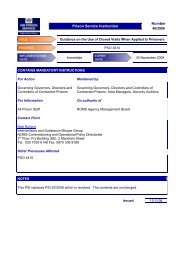PSO 4630 - Inside Time
PSO 4630 - Inside Time
PSO 4630 - Inside Time
- No tags were found...
Create successful ePaper yourself
Turn your PDF publications into a flip-book with our unique Google optimized e-Paper software.
<strong>PSO</strong> <strong>4630</strong> Page 49Conditions are always attached to a person‟s release, normally requiring him to reside at a specificaddress, to report regularly to the nearest Border and Immigration Agency reporting centre, andprohibiting the taking of employment. If granted bail, sureties are normally required who will depositmoney in advance, which may be seized if the subject absconds. If detained, a subject can applyat any time for his release either to the Border and Immigration Agency or to the Asylum andImmigration Tribunal (AIT).The decision to maintain detention is always examined in line with current policy, and is reviewedregularly by senior officers to ensure that the case is being progressed quickly and that thedecision to detain is correct and just. Detainees are sent an initial letter explaining the reasons whythey are being detained and how they can apply to be released. Thereafter, they are sent a letteronce a month explaining the present state of their case.Court AppearancesDetainees may have to attend one of the immigration courts from time to time. This will normally beto attend an appeal hearing, or for a bail hearing if they have applied to the Asylum andImmigration Tribunal.RemovalThe Border and Immigration Agency normally seeks to remove those persons with no lawful basisin the United Kingdom. However, before removal can be affected, any barriers which have arisenmust be resolved. These can be numerous, but the most commons ones are:1. Lack of a travel documentAll persons require a travel document of some description to travel internationally and thisincludes immigration removal cases. Many of our subjects do not, however, possess a validpassport either because he never possessed one and entered the country illegally, it hasexpired, become lost or he has deliberately destroyed it.Some countries allow their citizens to travel on a national identity card (particularly EEAnationals), others will allow the Border and Immigration Agency to produce its own traveldocument, known as an EU letter where supported by background information about thesubject (known as “bio-data”), but others require an emergency travel document (ETD) tobe issued by the nearest Embassy or High Commission. Where an ETD is required, anapplication form must be completed and submitted with photographs and any othersupporting evidence to substantiate the nationality and identity. Some countries have otherrequirements, for example some require fingerprints. For some countries the process isfairly quick, but for others it can be very lengthy, taking several months and may include aninterview with an Embassy official.The Border and Immigration Agency is therefore particularly interested in any relevantdocumentation in a prisoner‟s property which may be of use in securing the required traveldocument for his removal (for example any home country identity related documents) andwe always encourage prisoners to assist us in the documentation process.2. Late applicationsAny application for permission to stay in the United Kingdom (including asylum) must beconsidered before we can remove a person. In some cases this will be a relatively straightforward process, which can be resolved within hours, but for others it may take weeks,particularly where it is an application for asylum which will involve a long interview to takeIssue No 287 Issue date 11/01/08


